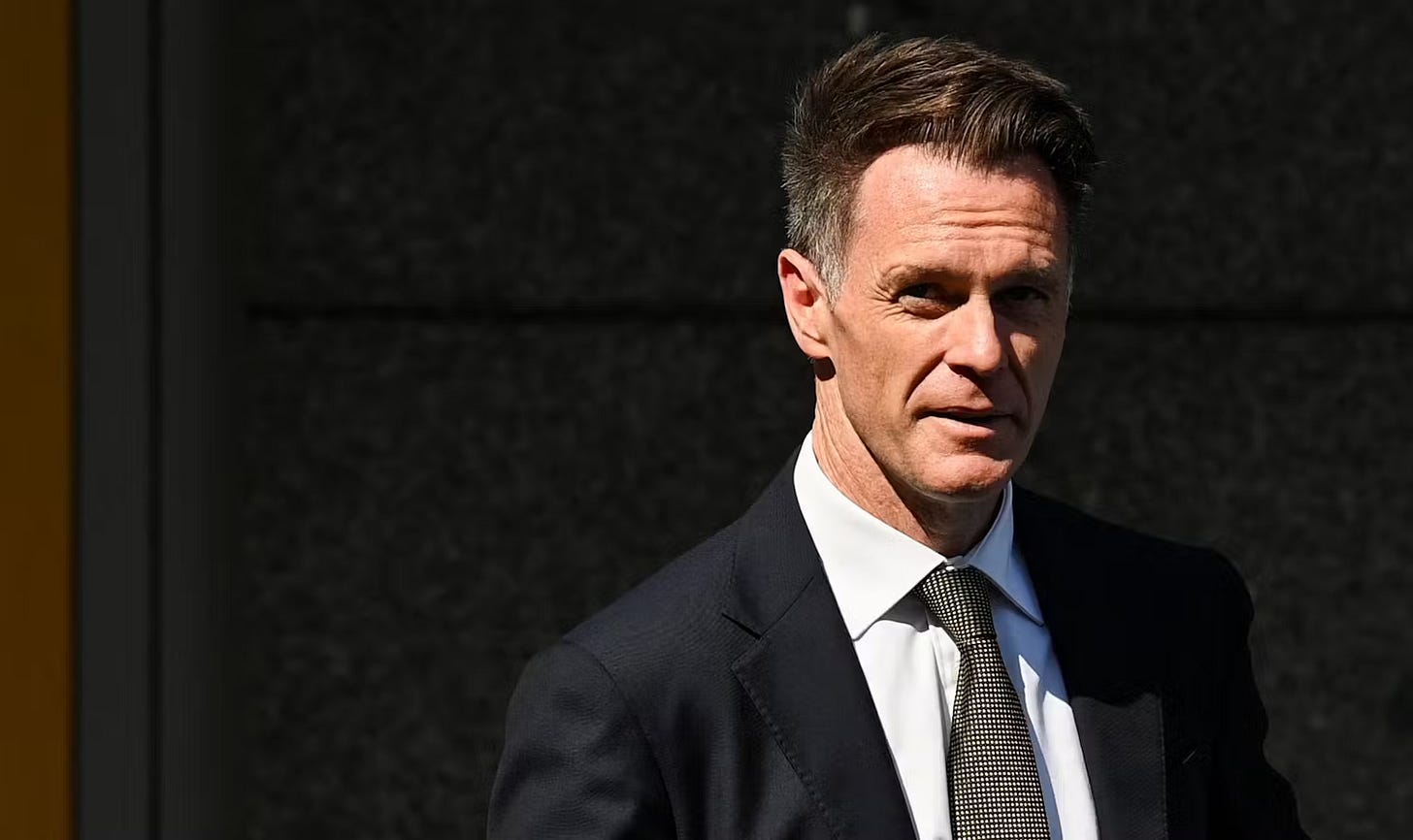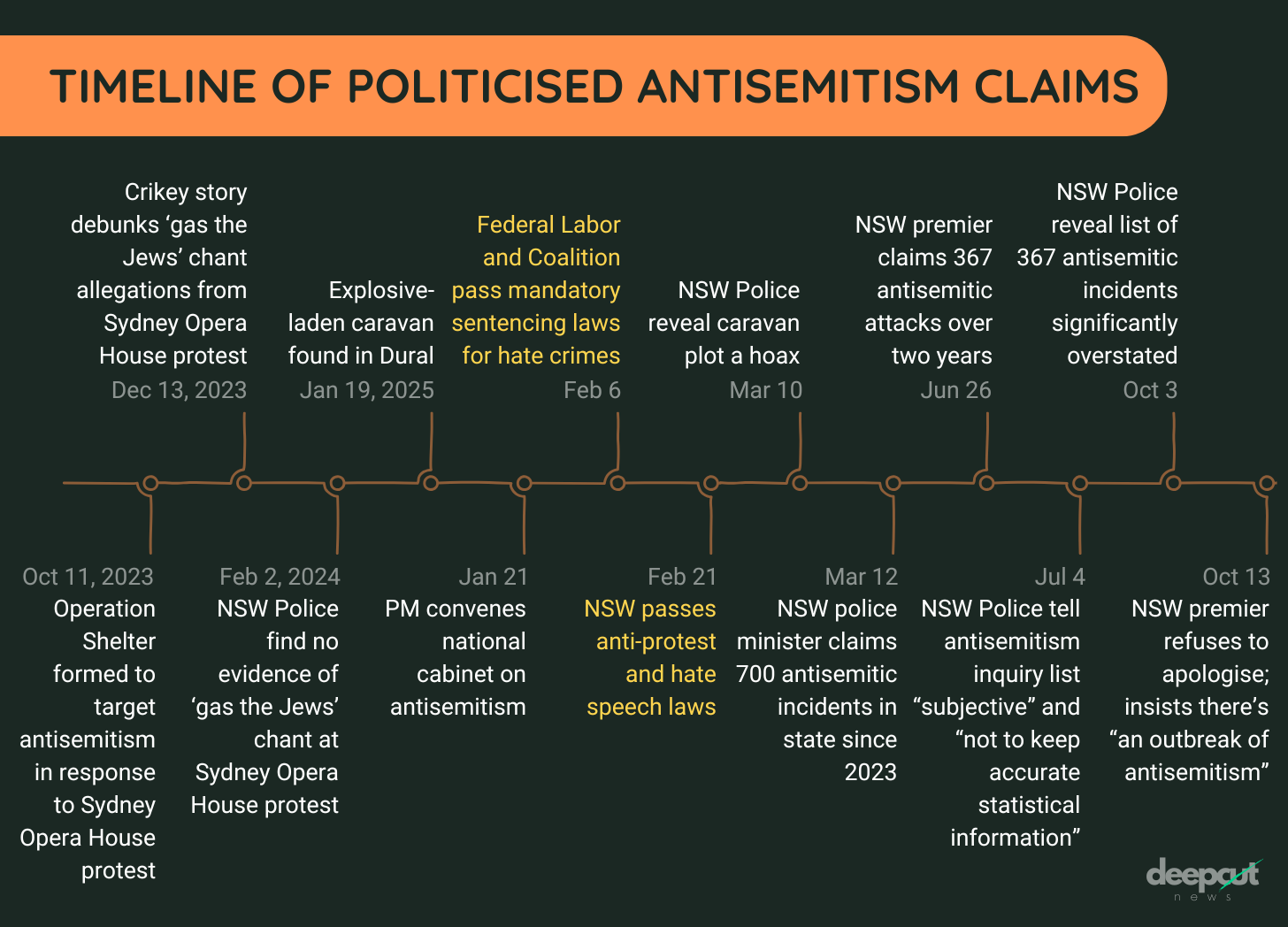Chris Minns exaggerated the scale of antisemitism in NSW – and won't apologise
The NSW premier had Australia believe antisemitic hate was running rampant. Police data has shown that to be false.
A NSW Labor MLC is calling for better education of Palestinian history within the Jewish community after NSW Police revealed claims of antisemitic incidents in the state were grossly exaggerated.
A NSW Police submission to a state parliamentary inquiry into antisemitism on October 3, first reported by Mick McGowan for the Sydney Morning Herald, noted that a “significant number” of 367 listed antisemitic incidents since October 2023 did not “meet the criteria for antisemitism”.
A Deepcut analysis of the 367 alleged antisemitic incidents reveal that:
117 incidents explicitly mention antisemitism
62 include mention of Israel and/or Zionism
59 are attributed to far-right and/or neo-Nazi activity
38 are duplicates.
“The errors in the antisemitism statistics are concerning, particularly the extent of them,” Stephen Lawrence, NSW Labor MLC, told Deepcut.
“The extent of antisemitism in the community is directly relevant to a number of legal and policy issues and correct information is therefore critical,” he added.
NSW government exaggerated scale of antisemitism
The revelations have increased pressure on hardline NSW Premier Chris Minns, who rushed through controversial anti-protest and hate speech laws in February following a spate of alleged antisemitic incidents over the summer.
One such incident was the discovery of an explosive-laden caravan found in Dural on January 19. In its immediate aftermath, Minns vowed to strengthen hate speech laws. But on March 10, NSW police disclosed the caravan plot to be a hoax orchestrated by organised crime.
The premier and his police minister, Yasmine Catley, brushed off accusations of misleading parliament in rushing through the controversial laws. It was at this moment that both Minns and Catley began to contentiously cite police data regarding the number of antisemitic incidents in NSW.
On March 12, Catley told a parliamentary committee that “from July 2023 until January 2025 there have been more than 700 antisemitic events and incidents and arrests”.
Except the figure later proved baseless. On April 7, NSW deputy commissioner David Hudson told a parliamentary inquiry that Minns and Catley had incorrectly referenced the data, adding that the police list included both antisemitic and Islamophobic incidents.
700 to 367 incidents from an inaccurate database
Despite the questionable nature of the police list, the premier continued to publicly cite police figures that crafted a narrative of drastically rising antisemitic hate in the state.
On June 26, Minns told parliament there had been “367 antisemitism attacks” in NSW over the last two years. The 367 figure was what Operation Shelter – NSW Police’s antisemitism taskforce – considered to be the number of antisemitic incidents.
But in a hearing on July 4, Hudson conceded that this “database is not to keep accurate statistical information; it’s for an operational use. It’s an internal – it’s not a requirement that we keep it”.
Hudson agreed that the database was “subjective”, and under further questioning from Lawrence – who serves as a committee member of the antisemitism inquiry – NSW Police admitted that the database was not vetted for meeting the threshold of a hate crime or incident.
“We’re not recording it to determine that it is a hate incident. It’s more from the victim perspective,” Jennifer Hastings, senior policy officer at NSW Police, told the inquiry.
Deepcut sent detailed questions to the premier’s office, asking why Minns used the word “attacks” – despite NSW police not describing the incidents in its database as such – and why the NSW government continues to present a narrative of rising antisemitism without evidence supporting the claim. We also asked whether the premier would correct the public record or issue an apology.
A NSW spokesperson refused to answer those questions, saying instead: “Over the last two years there has been an outbreak of antisemitism. Official records are only the tip of the iceberg with most instances of antisemitism and racism going unreported.”
Damage that can’t be undone
Lawrence is sharply critical of the tracking method used by police, which resulted in an inaccurate database being politicised and informing controversial legislation.
“I struggle in many cases to see how it was valid to catalogue at all what was clearly protected free speech and/or triviality,” Lawrence told Deepcut.
“The danger is apparent from what has occurred, the database has been deployed in a political context and, at least possibly, increased fear levels and impacted on political debates.”
Bart Shteinman, executive member of the Jewish Council of Australia, was equally scathing.
“While NSW Police have acknowledged the significant errors in their recording of antisemitic incidents, the damage to the public debate and social cohesion cannot be undone,” he told Deepcut.
“Too often we have seen politicians seek to inflame fears and weaponise trauma in our community for their own agendas. Jews are tired of our community being made into a political football by our elected leaders. It needs to stop,” he said.
Conflating criticism of Israel with antisemitism
A key aspect of the detailed list was the significant number of recorded incidents that referenced pro-Palestinian or anti-Israel activity – incidents, according to the Jewish Council and Lawrence, that should never have been recorded in an antisemitism database.
“Like other forms of racism, antisemitism in Australia is real and rising, and any one instance of it is one too many. But it does a disservice to the Jewish community to exaggerate statistics or conflate it with criticism of Israel, which aggravates the fears amongst some Jews of the growing pro-Palestine movement,” Shteinman said.
Lawrence called such complaints “baseless”, adding that it raised “a question about whether a) complaints are being weaponised or b) wrong headed conceptions of what is antisemitism are being propagated in the Jewish community”.
The Labor MLC suggested “genuine interfaith and community dialogues ... to better insulate ourselves from the socially harmful impacts of foreign conflicts and issues”.
That might include education within the Jewish community on Palestinian history, he says, which “could assist the community in better understanding the distinction between the scourge of antisemitism and legitimate criticisms of Israel”.






Thank you for this reporting
Religion mans worst invention, nothing but trouble no matter the franchise.